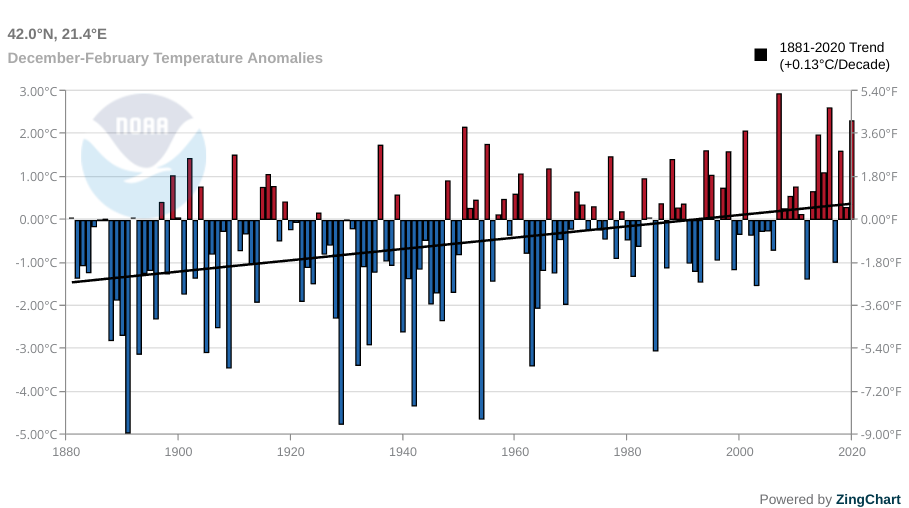Did You Feel That? Last Winter was Europe’s Warmest Ever
Many Macedonians woke up to the first bit of snow they had seen all winter last Sunday, two days into Spring. The few days where a light layer of snow coated places like Skopje and Strumica were the exception to an otherwise warm and dry winter. So warm in fact that it smashed records according to climate scientists.
According to entities like the EU’s Copernicus Climate Change Service and NASA, the 2019/2020 winter was the hottest in Europe “by far” as the average temperature across the continent went up to 3.4°C above the average. Globally, the season was the second warmest on record right after 2016 which was exacerbated by El Niño; a natural occurrence when the planet experiences warming sea in the Pacific Ocean and warms the planet more than usual. It is important to keep in mind that 2019 was also the second hottest year on record.

European temperature anomalies for December 2019 - February 2020 (source: NOAA)
Climate scientists and meteorologists have once again reiterated that the observed warming during the past winter is largely attributable to man-made climate change. The National Climate Assessment in the United States confirmed that “human activities, especially emissions of greenhouse gases, are the dominant cause of the observed warming since the mid-20th century.”
The extent of warming varies in different parts of the world. In January and February, Helsinki, Finland experienced a whopping 6°C above average. In North Macedonia, average temperatures were 2.3°C above the average making it the third warmest winter in the county on record. In the Southern Hemisphere, Australia’s summer was not only characterised by large bushfires which devasted massive parts of the country but it also went down as the second hottest documented. Antarctica’s temperatures also went above 20°C for the first time on record.
Europe’s exceptionally warm winter affected many aspects of daily life including agriculture and various types of food and drink production such as Germany’s ice-wine harvest which was written off as a failure this year. Winter sports and tourism were also negatively affected as countries like Sweden and Russia were forced to import snow for their sporting events. The situation was no different in the Balkans as many ski resorts across the region had to rely on artificial snowmakers to keep their resorts open. In Barsov, Romania this was not even possible when temperatures rose to 17°C making it too hot to even produce artificial snow leading to the ski resort’s closure for at least one month. After multiple complaints and requests by resorts around Montenegro who had no artificial snowmakers, the government has promised to make them available next year.
The ski centres in Mavrovo and Popova Šapka in North Macedonia had their snowmakers running full time to meet the minimum requirements for snow sports and to stay open as the areas had anywhere from just 30cm of snow to nothing at all at different times. The Chamber of Tourism confirmed this season as being weaker than most. This situation confirms earlier reports that the climate crisis will threaten the existence of at least 6 of the 7 ski resorts in the country as temperatures continue to warm and snow security dwindles.
As the world currently exists at 1.2°C warming and hurtling uncontrollably towards to the 1.5°C threshold that scientists have warned us to avoid, signs like this exceptionally hot winter serve as further (and unnecessary at this point) confirmation of this. Of course, the closures of ski resorts and the failing of ice-wine harvests are just tip-of-the-iceberg consequences of what is in store. Agriculture, water security, biodiversity, and the spread of diseases along with so many other aspects of our daily lives are on the line without immediate and effective action to slow down the climate crisis and change the economic system that facilitates its exacerbation.
Sources:
1. This winter in Europe was hottest on record by far, say scientists (The Guardian)
2. The boreal winter season 19/20 was by far the warmest winter season ever recorded in Europe (Copernicus)
3. What winter? Earth just had its second-warmest December-February on record (USA Today)
4. Winter and February 2020 end as second warmest on record for the globe (climate.gov)
5. Europe experiences exceptionally warm winter (BBC)
6. NOAA National Centers for Environmental Information, Climate at a Glance: Global Time Series, published March 2020, retrieved on March 27, 2020 from
https://www.ncdc.noaa.gov/cag/ 7. Artificial Snow Rescues Balkan Ski Resorts amid Warm Winter (Balkan Insight)
8. Climate Risk Profile North Macedonia (USAID)
The Authors:
Simona Getova and JD Farrugia
-
Корисни линкови
26-01-2021 -
Справување со климатските промени и загадувањето на воздухот во градот Скопје
29-04-2018 -
Финансирање во климата
28-01-2022 -
Микронаративи
08-06-2022
{{"article.lastestPosts"|translate}}
-
Нови финансирања за унапредување на природата и биолошката разновидност на Зелената агенда за Западен Балкан
11-03-2025 -
Започна проектот за развој на 1-от и 2-от двогодишен извештај за транспарентност и 5-от национален извештај за климатски промени на С.Македонија
04-03-2025 -
Земјоделски форум за климатски промени: Се изнаоѓаат решенија за поголема климатска отпроност на заемјоделието
02-12-2024 -
Заврши COP29, центарален фокус на финасирањето за климата
02-12-2024



 Мод за знаковен јазик
Мод за знаковен јазик Говорен асистент
Говорен асистент Означи линкови
Означи линкови

 Зголеми маус
Зголеми маус